- Home
- Kristin Billerbeck
A Girl's Best Friend Page 17
A Girl's Best Friend Read online
Page 17
“The whole time,” I cross my heart with my hand. “I promise.”
“You’ll be back by Thursday night?”
“Thursday night, early.”
He opens his wallet, takes out five crisp twenty dollar bills, and counts them for me. “Can you live on this until Thursday?”
“I can live on less than that,” I say, handing him back his cash. I’m offended. I mean, what do I do to give off this lameness factor to people? Wait. I don’t think I want the answer to that question.
Poppy is gathering up the bottles of oil she’s brought, and she looks at George, and then to me, and backs out of the room. “I’ll just wait outside.”
As I stand face to face with the telling eyes I’ve grown to trust so quickly, I feel the root of my issues rear their ugly head. I am so quick to hope, so willing to believe that every man in front of me is my hero, my rescuer, that I never change. I play weak, and even dead to get what I want, and it’s pathetic. And I’m done in that role.
As I stare at George with the money in his hands, I don’t even want to say what it makes me feel like. A flush of anger rises within me, like a fountain that’s just been turned on. He’s getting paid to do his job, and that’s all there is to it. If George didn’t have access to my father’s payment for his services, I wouldn’t have George, and that’s the harsh truth.
“Keep your money,” I say.
“Morgan, you might need it. How will you eat?”
“I’ll sponge off my friends, like normal people do.” I think of the freeze-dried noodles at Lilly’s and shudder.
“At least let me take you to dinner. It’s been a long day and you need to keep your strength up.”
This makes me laugh out loud. Keep my strength up? What am I, Oliver looking for some porridge? Honey, I was living on coffee long before you started law school.
In George’s honest brown eyes I see exactly what I saw in Andy: a rescuer, a knight in shining armor who has come to take me away from everything. And finally, I see the pattern. Men only compound my problem, which must, as Poppy would put it, be at the cellular level or I’d be brighter by now. As I sit on the cusp of entering federal prison, I realize that perhaps trusting another man is not the best course of action.
“You don’t have to take care of me, George. I am not a child, and I do not need to be fed. Whether you believe it or not, I am capable of finding myself dinner. I can still go back to my father’s apartment, can I not?
“Did you want to do that?” he asks, blinking in what I can only assume is mock innocence.
“If I did, am I allowed to do that? From the government’s point of view, I mean. Your legal opinion?”
“You’re free to go, Morgan. Do whatever you wish. Just be back in town on Thursday night, and I’ll go through all these allegations before then and make sure we’re prepared. If you are charged officially, you won’t be able to leave the county without permission, so I think now is a fine time to go to Spa Del Mar.”
“What’s my defense?” I ask, wondering if there’s a chance under the sun I might beat this rap. My lawyer may be optimistic, but perhaps all that ab work has gone to his head.
“That you didn’t have anything to do with this. You’re innocent. Right?”
“Of course I’m innocent. Do you have to ask?”
“You’re upset. It’s been a long day, Morgan. Go home and relax. I’ll make sure your expenses are covered at the spa.”
I’m upset? Well, isn’t my lawyer the genius. And discerning too! “I don’t want you to make sure of anything like my spa stay being comfortable. You’re my lawyer, and I don’t need to go to the spa, George. I want to go. I’ll find a way, and if I choose to stay home, I will.”
“Morgan, why do you insist on fighting with me? Why are you so afraid to let me do my job?”
That’s a good question, isn’t it? “No offense to you, George. But I’ve learned my lesson about putting trust in people too quickly. I’m sorry if you’re bearing the brunt of that, but I’m done trusting people.” Especially of the male persuasion, I add silently.
“If it makes you feel better, you’re paying me well to care for you.”
“Not really, no. So money is your motivator—do you have a wife somewhere who doesn’t treat you right? Are you misunderstood? Frustrated? Doesn’t she listen to you?”
George slams his folder into his briefcase. “You’re way too young to be so bitter, Morgan. So you’ve made a mistake. Welcome to the real world. You’ve been hurt; doesn’t that make you special? I have to say it’s better to be hurt than bitter. Bitterness is like a well gone bad. Heartache crushes the spirit. I’ve survived it, and I’m here to tell about it, and God gave me the greatest blessing from that suffering.”
“Thank you, Billy Graham.” I gather up my purse. “In fact, I am planning to trust you. So don’t let me down.”
chapter 21
Poppy drives me back to the penthouse, and I decide I’m going to grab as much paperwork as I can find and stuff it into my Coach overnight bag. I want to know exactly what I’m accused of and just how much I may actually be guilty of. Maybe I’ll be like those men who get their law degree in prison.
“I like George,” Poppy says as we reach the apartment.
“How nice for you. He’s single—do you want me to set you up?”
“As if.”
“As if, what?”
“As if a guy in a European suit is going to be interested in me. He has good energy, though. You might keep that in mind, Morgan. In case you ever get interested in the male species again.”
“Really? Good energy?” I say with too much enthusiasm.
“Seriously good energy. I just wanted to reach out my palm and feel it.”
“Oversharing, Poppy. Don’t scare me. I can put up with only so much of the weird talk, okay? When you start feeling for people’s energy, you totally lose me, and I think sanitarium.”
“In the beginning, God created light. Light equals energy, God’s first building block.”
“You scare me. Seriously, sometimes, Poppy, you sound like you worship at one of those transcendental schools of enlightenment.”
She shakes her head, “Absolutely not. I’m a Christian through and through. I just believe God created the body to heal itself for the most part. We need to be quiet and listen. The body tells you so much if you only listen to it. But you know, when you get out of whack, it’s harder and harder to hear.”
“Enough, though, all right?”
“It doesn’t matter if I’m interested in the hot lawyer anyway, because George has eyes for no one but you. Did you notice he looks at you like Max looks at Lilly?” She shakes her hand. “I felt it. Seriously hot. Now there’s some energy.”
“He does?” I almost want to tell Poppy what happened in that interrogation room, but I know better. My friends have heard from me and my false-hope handbag way too often.
“Listen, I’ll pick you up in an hour. I called Lilly on the cell phone, and I’m going to pick her up. She has to work while we’re at the spa, but she’s coming and bringing her sketch book and a gown she has to finish.”
“Perfect. Give me at least an hour.”
I rush into my father’s office while Poppy goes back down the elevator. I start to go through more of the paperwork he left strewn on the floor. There are countless receipts and bank statements from a bank in Caicos. Lord, I don’t even know where that is! Have mercy on me.
I look over the statements, and my stomach churns. There is more money in these banks than I ever thought possible. I always knew my father had money. I just had no clue how much. One particular copy of a check shows my signature for our mortgage, which is made out to a bank in Bermuda. This does not look good.
One thing is certain, the diamond business means noth-kristin ing to him. It’s a front. I look at all the bank accounts, and my name is on at least half the statements. I know my father thinks he was protecting me, helping to ensure my future. As it turn
s out, my future may be life without parole.
“What are you doing?”
“Ah!” I turn around to see Mrs. Henry standing over me, her fist resting firmly against her full hip.
“Did you find what you’re looking for?” She goes for the paperwork and starts to stack it.
“Mrs. Henry, what are you doing here? I thought you’d be at the hospital with my dad.”
“It turns out his lovely Gwen is taking fine care of him and doesn’t want me around.”
“Do you know I’ve been arrested?” I ask sheepishly. I mean, she could have called the feds herself for all I know.
“The men were here for you earlier.”
“And you told them when I’d be back?”
“I did no such thing, Miss Morgan. They obviously came back.”
“Thanks for the warning. I do still have a cell phone.”
She picks up more of the paperwork. “What have they charged you with?”
“Tax evasion and fraud.”
She nods knowingly.
“You don’t seem surprised.”
“Why would I be? Your father’s been making mysterious trips for years, and he pays me way more than seems fitting for what I do. I’ve learned to not ask questions. I figured there had to be some sort of bribe involved. But since it’s putting my grandson through college, I hardly saw the need to ask about it.”
“What will happen to you if we go to jail?” I ask her, just to see if she’s concerned.
She’s not. “I imagine I’ll retire. I’ve been squirreling away money since I started here. Your mother left me a small stipend when she died. Well, that’s not true—it was quite healthy for the times. Reaganomics, you know. It was the best of times, it was the best of times.”
Mrs. Henry has always been somewhat of an unknown to me. I can remember her sopping up the sweat from my mother’s forehead, crushing the many pills, and putting them in homemade cheesy-mashed potatoes. Much to my mother’s dismay. Although she weighed about eighty pounds during her illness, Traci Malliard was so worried about gaining weight it was a chore to get her to eat.
Yet in all her concern for my mother, I can’t remember a single thing Mrs. Henry ever did that was kind for either me or my father. She did a lot. Just none of it out of the goodness of her heart. My memory is riddled with her cool and aloof demeanor, her absolute inability to speak to me in a warm way, and her apparent anger, always simmering under the surface. I was afraid that any step I made might tip her to boiling over, and so I stayed clear. It was as though even looking at me was a chore for her.
“But you never questioned anything my father did?” I ask.
“I never thought your father would do anything illegal. I still don’t, Morgan. He’s a businessman. He always put money ahead of anything else, there’s no doubt about that, but he’s about playing the game, not cheating it. You’ll be fine. You always are.”
“Let’s hope that’s the case.”
“I never expected to hear that out of your mouth.”
Neither did I.
“Why have you stayed so long?” I get up from the floor and find my way to the leather sofa. “You obviously never liked my father or me.”
“It’s not that I didn’t like you, Morgan. It’s that I saw what your father did to your mother, and I have a hard time forgiving, I suppose. She was a fragile lady, your mother. But I know that she would have wanted you looked after, so I just kept to myself.”
I start to laugh. “You’re saying you stayed for me? You, who never gave me a moment’s attention or a word of kindness? You stayed for me, is that right?”
“Morgan, things are often more complicated than they look from our own perspectives. I was never the motherly type—you can ask my own daughter if you don’t believe me—but I did see to it that you always had three square meals every day. And when your father tried to talk you out of going to college, it was me who pushed you into Stanford.”
“I thought you were trying to get rid of me.”
“I was trying to make sure you had a life of your own. That’s what your mother never had. She didn’t have the education or the talent to make it on her own. She was beautiful, there’s no doubting that, but she lacked the star quality on the screen. She was always going to be second rate in terms of acting, and I think she understood that. That’s why she married your father in the first place. She thought he’d care for her.”
“He did care for her!” I insist. “He made sure she had round-the-clock care.” But as I voice my contradictions to her tale, I’m only prodding to hear more. I always thought there was more to the story, but I was too afraid to deal with the truth. If I have to deal with a low-security, federal prison, I imagine this will be a walk in the park.
“He didn’t really care, Morgan, not in the important ways.”
This comment gives me pause as I think about my mother and her screeching voice calling after my father. But there’s one scene I’m seeing as if for the first time, and it’s my mother yelling at my father’s back.
“Did he pay attention to her?”
“Not after the first year. By then, she was like a worn toy to a child. He’d moved beyond being interested.”
I feel the tears sting my eyes as I think about hearing anything negative about my father. “I saw what he took from my mother. I saw what he endured. And he never abandoned her, Mrs. Henry. He made sure she had the best care her whole life.”
But even as I say it, I don’t fully believe it. The memories are coming back more vividly now. My mother crying after my father, begging him not to go to a meeting, and him slamming the door on her while she sobbed.
Mrs. Henry smiles condescendingly at me. “Sometimes, Morgan, people can be physically present and yet they still have abandoned you.”
I can’t speak. In my subconscious, I know what she says is true. My home has always had a layer of frost on its walls.
“I have something for you.” She exits my father’s office, and I start to rifle through all the paperwork, and I see my name on nearly every sheet. I am in so much trouble, it’s not even funny. As he lies alone in that hospital room, I have a hard time feeling anything toward my father. I search for the excuses that he had my best interests at heart, but right now, they’re not ringing true.
I look at the paperwork, and the shredder sitting behind it, and I cringe at the thought. For about one second I think of shredding everything. Not because it’s evidence of my guilt, but because it’s evidence that my father is not the man I have always thought him to be: hard-nosed and lacking emotion, but always, always the one who had my best interests at heart. Even when he wanted to exploit my publicity for the store, it was so my inheritance might grow. I know my father.
Mrs. Henry comes back and sees me hovering over the shredder. “Don’t do it, Morgan. Besides, the government has already been here. If they wanted it, they have it.”
I pull the papers away. “I only thought of it for a moment. I wouldn’t have done it.” And really, I wouldn’t have. God did give me a conscience.
Mrs. Henry hands me a pretty envelope in pink linen that reads “Mrs. Traci Malliard” in raised letters in the upper left-hand corner. My name is scrawled across the front. I run my fingers over the letters.
“Where did this come from?” I ask, knowing full well it’s my mother’s handwriting. Even though I was ten when she passed, I remember that much. Is there anything more personal when someone’s gone than her handwriting? Or her voice on the answering machine? It’s haunting, and yet you can’t bring yourself to erase it.
“I’ll leave you alone.” Mrs. Henry exits the room and shuts the office’s double doors behind her.
I stare at the envelope for a long time, wondering what my mother might possibly want to say to me all these years later, and why Mrs. Henry would keep it for so long.
Finally I jump up from the sofa and follow Mrs. Henry into the sterile kitchen, its granite countertops freshly gleaming, the strong scent of
the polisher lingering. “Why now?” I ask, holding up the envelope.
“You’re finally ready to hear it. I hoped that day would come. Independence Day, I’ll call it. I needed to know that you saw the chink in your father’s armor.”
I look down at the envelope, and I say a small prayer. I can’t help but wonder what was behind my mother’s stunning façade, and if perhaps this holds the key. I want to tear into it, and be done, but I’m so worried I’ll be disappointed that I stuff it into my coat pocket. “I’ll read it at the spa.”
“You’re going to that spa? Again? Morgan, you have an obsession.”
“I do.” I square my shoulders, just to show her I mean it. The spa is the one place on earth I feel free.
She shakes her head as she walks away from me. “You’re your mother’s daughter, all right.”
“I think this is the kind of letter that should be followed with a hot-stone massage chaser.”
Mrs. Henry rolls her eyes, and I forage through her heavenly leftovers in the refrigerator. George is living in a fantasy world if he thought he could feed me better than this. I sigh dreamily.
“What’s the sighing about?”
“Do you think I’ll ever get married, Mrs. Henry?”
“I sure hope so, Miss Morgan, and I hope all these test runs you’ve taken have taught you a thing or two your mother never learned.” She doesn’t say this with a hint of loving-kindness or concern. It’s more of an attack. Sort of the equivalent of, “If you can find someone stupid enough, sure you can get married.”
Mrs. Henry shoos me out of the way and prepares something for me while I sit at the kitchen island wondering what kind of relationship my parents actually had. I thought Mrs. Henry held the key to my history, but it’s clear she’s not about to share it with me. My parents’ icy realm frosted all who lived here, apparently.
It’s really no wonder my father picked diamonds as his business. They are the hardest substance on the planet, and I imagine he feels a certain kinship to them.
chapter 22
Before we leave San Francisco, we go by the gym and pick up my Beamer. I think if you’re going to go to prison for extortion, fraud, and tax evasion, you should definitely go in a high-end German car. It shows that at least you have good taste and appreciate fine engineering. So we arrive at the Spa Del Mar in style, and let’s just say they aren’t surprised to see us. I’m struck by something I learned back in my church counseling days (when I actually thought I should be counseling, rather than realizing I was more the counselee). Addictive behavior is a cycle. Something negative happens, it triggers a response in us, and we need instant gratification. And so we fill ourselves with whatever that gratification is, be it alcohol, caffeine, marriage proposals, etc.

 The Trophy Wives Club
The Trophy Wives Club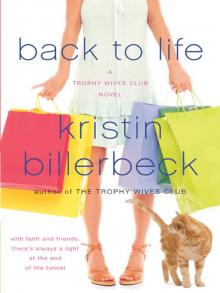 Back to Life
Back to Life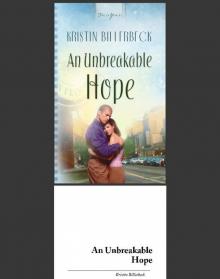 Unbreakable Hope
Unbreakable Hope The Scent of Rain
The Scent of Rain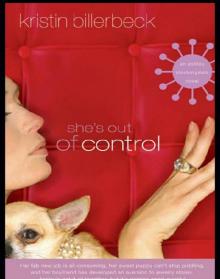 She's Out of Control
She's Out of Control She's All That
She's All That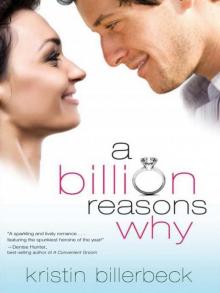 A Billion Reasons Why
A Billion Reasons Why Perfectly Ridiculous
Perfectly Ridiculous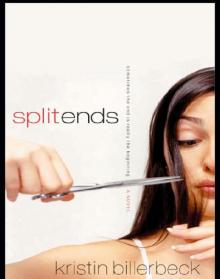 Split Ends
Split Ends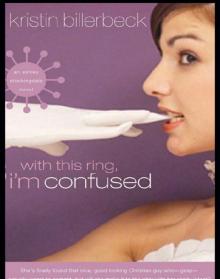 With This Ring, I'm Confused
With This Ring, I'm Confused What a Girl Wants
What a Girl Wants The Valiant Hearts Romance Collection
The Valiant Hearts Romance Collection Perfectly Dateless
Perfectly Dateless Calm, Cool, and Adjusted
Calm, Cool, and Adjusted The Theory of Happily Ever After
The Theory of Happily Ever After A Girl's Best Friend
A Girl's Best Friend